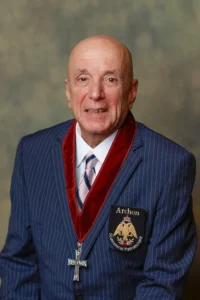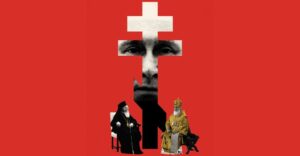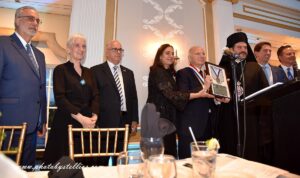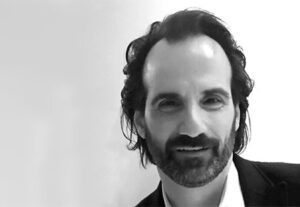The Washington Post recently reported on ‘In Turkey, can Islam and democracy coexist?’ by Anthony J. Limberakis, M.D., and Jordan Sekulow.
Dr. Limberakis is the National Commander of the Order of Saint Andrew, Archons of the Ecumenical Patriarchate, which is sponsoring its Second International Conference on Religious Freedom in Berlin, December 4-5. Mr. Sekulow is the executive director of the American Center for Law and Justice (ACLJ) and will be one of the featured speakers at The Archon Conference.
In Turkey, can Islam and democracy coexist?
The Washington Post, by Anthony J. Limberakis, M.D. and Jordan Sekulow
November 22, 2013
Read this article on The Washington Post »
For over a thousand years, Istanbul (then Constantinople or New Rome) was the capital of the Christian Roman Empire. For nearly 600 years, it was the capital of the Islamic Ottoman Empire. Today it remains on the cusp of continents and may well hold the key to stability in the Middle East.
As virtual dictatorships throughout the Arab world crumble – Iraq, Egypt, Libya, Syria – America has learned a costly lesson. The Islamic reality of the Middle East is neither monolithic nor predictable. The complexities of Islam in the modern world and the currents of fanaticism and radicalism cannot be regulated by Western-style democracy or military intervention.
However, there is one country in the Islamic world where the democratic formula seemingly works: Turkey. The past 30 years have seen Turkey evolve from a secular military sovereignty into the first truly possible Islamic democracy. The man behind this evolution is Prime Minister Recep Tayyip Erdogan, and now is his moment. Erdogan has successfully re-introduced Muslim traditions into Turkish society without breaching utterly the Kemalist levee – the principles upon which Turkey was founded. But in order to succeed in promoting democracy, he must embrace the very core of democratic values, which includes the protection of minority rights.
Turkey can no longer afford to treat its religious minorities – Catholics, Protestants, Jews, Alevi Muslims, Armenians, Syriacs and Orthodox Christians – as second-class citizens. The Turkish government, and its Islamic majority, must recognize the legal status of these communities. Especially critical regarding the Ecumenical Patriarchate, the first See of the world’s 300 million Orthodox Christians, Turkey must reopen the Halki Seminary, which was forcibly closed more than 40 years ago. Halki has become the rallying cry for religious freedom in the region.
In his address to the Turkish Parliament in 2009, President Obama called for the reopening of the Halki Seminary. Like many other American politicians, including Congressman Gus M. Bilirakis who is holding a Capitol Hill briefing this week highlighting the significance of the Halki Seminary to the Orthodox Christian faith, President Obama recognizes the critical importance of reopening the Seminary in improving religious freedom in the region.
If democracy is to succeed in the Islamic world, it must succeed in Turkey. Most assessments of the trajectory of the ‘Arab Spring’ project a dire outcome. Either we face more of the same militaristic tyranny, or worse – chaos. Both scenarios do nothing to help the prospects of an abiding solution for the Palestinian people or a lasting peace with Israel. Compounding this pessimistic scenario is the ever-quickening pace of the exodus of Christian minorities from the Middle East. The largest Christian population is in Egypt, where violence against the Coptic minority is on the rise. Syria has the second largest, and the kidnapping earlier this year of the two leading Christian leaders of Allepo, Greek Orthodox and Syriac Orthodox faiths, lingers without any sign of life.
The exodus of Christians from the Middle East should be the proverbial “canary in the coal mine” for all parties. Here in the United States, Muslim minorities remind all Americans of the principle of our Bill of Rights and freedom of conscience. When a figure of no repute threatens to burn a Koran, the nation is galvanized, generals implore, and even a president apologizes. However, when villages in Syria, where Christians have lived in peace for 2000 years, are pillaged and Christians murdered and raped, the silence from the historic Islamic world is deafening.
Religious freedom is more than Turkey’s bridge to the European Union. It is the bridge between East and West, between the best of the Ummah, the community of believers, and the democratic tradition in action, where the rights of all those who inhabit the same space and culture are embraced and protected.
Istanbul has always been the cusp of East and West, the crossroad. It is where Mr. Erdogan began his life and his political career. It can also be where he chooses to lead a true Islamic evolution to democracy. If he chooses wisely, the entire Middle East may yet be transformed beyond the mire of violence and stranglehold of tribalism that threatens not only the weak, but also those who consider themselves powerful today.
Indeed, if Mr. Erdogan begins by reopening by the Halki Seminary, he may even be worthy of the Peace Prize that so many covet, but so very few ever exemplify.
Anthony Limberakis is the National Commander of the Order of Saint Andrew, Archons of the Ecumenical Patriarchate, which is sponsoring its Second International Conference on Religious Freedom in Berlin on December 4th and 5th. Jordan Sekulow is executive director of the American Center for Law and Justice (ACLJ) and Senior Counsel of the European Centre for Law and Justice (ECLJ).







